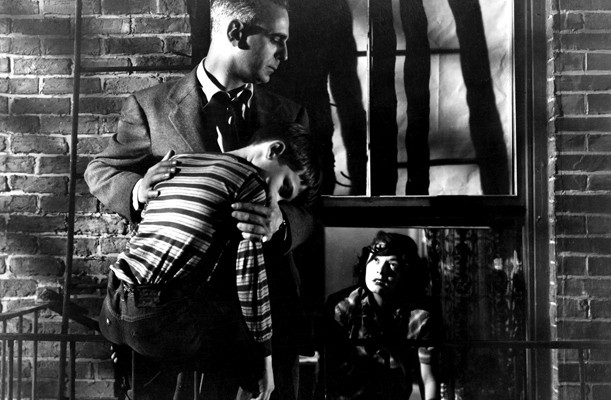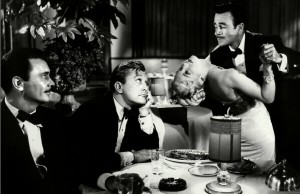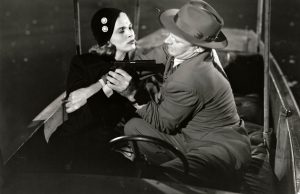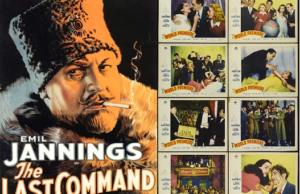The Window (1949)
By Toronto Film Society on April 23, 2015
Toronto Film Society presented The Window (1949) on Monday, October 25, 1976 in a double bill with The Letter as part of the Season 29 Monday Evening Film Buff Series, Programme 1.
Production Company: RKO Radio. Producer: Frederic Ullman Jr. Director: Ted Tetzlaff. Screenplay: Mel Dinelli, based on a story by Cornell Woolrich. Photography: William Steiner.
Cast: Bobby Driscoll (Tommy Woodry), Barbara Hale (Mrs. Woodry), Arthur Kennedy (Mr. Woodry), Ruth Roman (Mrs. Kellerson), Paul Stewart (Mr. Kellerson).
The mounting terror of a young boy who lives in mortal fear of his life is projected with remarkable verisimilitude by 12 year old Bobby Driscoll in The Window. The striking force and terrifying impact of this RKO melodrama is chiefly due to his brilliant acting, for the whole effort would have been lost were there any suspicion of doubt about the credibility of this pivotal character.
Occasionally, director Tetzlaff overdoes things a bit in striving for shock effect such as when the half-conscious boy teeters on the rail of a fire-escape or is trapped on a high beam in an abandoned house on the verge of collapse. However, although you may be aware of the contrivance in these instances, it is not likely that you will be immune to the excitement. Indeed, there is such an acute expression of peril etched on the boy’s face and reflected by his every movement as he flees death in the crumbling house that one experiences an overwhelming anxiety for his safety.
Like the boy who cried wolf too often Tommy Woodry has such an expansive imagination that even his parents refuse to take him seriously when he tells them he saw the couple upstairs kill a man. The police are a little more sympathetic, but having nothing to go on, and much against the persuasion of the parents, make only a cursory investigation, which further discredits his story. His mother insists that he apologize to the Kellersons, brushing aside the child’s pleas that now they will kill him also. Thus the stage is set for a frightful game of hide and seek, with the boy not being able to summon any help.
The Window begins rather slowly while the author and the director carefully establish the fanciful workings of Tommy’s mind in ssociation with playmates, and the distressing concern that this causes his perturbed parents. Although Tetzlaff’s direction is not always as restrained as might be desired there is no denying that his contribution looms large, for he has not permitted any of several increasingly harrowing incidents to spoil the full, crushing force of the picture’s climax.
Barbara Hale and Arthur Kennedy are altogether natural as the boy’s parents and Paul Stewart and Ruth Roman play the Kellersons with just the right show of fear and desperation. But The Window is Bobby Driscoll’s picture make no mistake about that. It stands, too, as a splendid tribute to its producer Frederic Ullman Jr, who had guided Pathé News for many years and made this picture as his first venture into regular theatrical production.
Notes from Thos M. Pryor’s New York Times Review, August 8, 1949
The misfortunes of former child actors are seldom more poignant than those of Bobby Driscoll. Bobby nosedived from Hollywood fame to a pauper’s grave in Manhattan. His plunge from the heights of being the delightful hero of Walt Disney’s Song of the South (1946) to a vagrant with a prison record is one of the most tragic of Hollywood’s personal disasters. He was born on March 3, 1937, in Cedar Rapids, Iowa. When his parents moved to Los Angeles in 1943 it was suggested that the boy audition for the movies. Bobby visited MGM and landed a brief role in Lost Angel (1943) which starred the new child sensation Margaret O’Brien. He was soon commuting to all the major studios. At age six, he was earning $500 per week.
In 1946 Bobby became the first human actor ever to sign a performing contract with Walt Disney, for Song of the South. It was a big box office success. Another Disney feature, So Dear to My Heart (1948) was also a great success, and co-starred Bobby with Burl Ives, Beulah Bondi, and Luana Patten (his girl friend).
His most acclaimed performance was in The Window, and the 1949 Oscars saw Bobby receiving a special statuette presented to him by Donald O’Connor in recognition fo his uncanny dramatics in this production.
When Walt Disney made alive-action remake of Treasure Island (1950) Bobby was an engaging Jim Hawkins. He also gave fine accounts of himself in When I Grow Up (1951), and in The Happy Time (1952). He was the voice and model for Disney’s animated Peter Pan (1953).
Then the bottom fell out of his career and life. As young Driscoll became an acned teenager, good roles became a bit scarcer. His social life suffered accordingly. At the age of 19 he was arrested for possession of marijuana and was back in jail a month later on a battery of charges (shooting at young ladies on the street with a pea shooter!!) He had begun taking drugs and the narcotics affected his brain. “I had everything. Working steadily with good parts. Then I started putting all my spare time in my arm. I’m not really sure why I started. I was seventeen…in no time at all I was using whatever was available–mostly heroin.” In 1961 he was arrested for robbery and a few months later for forging a stolen cheque. The result was a six month term at the State Narcotics Rehabilitation Centre, in Chino, California.
Upon release his life style did not improve–he always felt people were pointing at him and thinking ‘you can’t trust an addict’. In 1965 he ran away from everybody. When Bobby’s father became seriously ill, Mrs. Driscoll tried hard to locate her son, even writing to Merv Griffin who had met Bobby at a telethon However, despite all efforts, he was not found.
On March 30, 1968, two children playing in an abandoned tenement discovered the corpse of a young man surrounded by litter. There was no money or identification on the body. After the unidentified corpse was fingerprinted by a city examiner, it was interred in a pauper’s grave in the city cemetery.
Bobby’s failing father still wanted desperately to see him so Mrs. Driscoll asked the F.B.I. and Walt Disney Studios to help. It was not until 1969, two weeks after Mr. Driscoll died, that a Los Angeles county law agency, through fingerprints, confirmed for Bobby’s mother that her son was dead, that he was indeed the unknown person found dead of a coronary attack in the tenement back in 1968, age 31.
Great Child Stars by James R. Parish (Ace Books, 1976)
Notes compiled by Barry Chapman
You may also like...
-
News

Frances Blau
Toronto Film Society | February 27, 2024On Monday, February 26th, 2024, Toronto Film Society lost longtime friend, supporter, and board member Frances Blau. Known for her sense of humour, her love of film, her generosity,...
-
Special Events

Arsenic and Old Lace (1944) at the Paradise Theatre
Toronto Film Society | April 21, 2024Toronto Film Society presents Arsenic and Old Lace (1944) at the Paradise Theatre on Sunday, May 5, 2024 at 2:30 p.m. Screwball comedy meets the macabre in one of...
Programming

Virtual Saturday Night at the Movies
Toronto Film Society | April 11, 2024Toronto Film Society is back in the theatre! However, we’re still pleased to continue to bring you films straight to your home! Beginning Season 73 until now we have...
4-
 Toronto Film Society | April 21, 2024
Toronto Film Society | April 21, 2024
-
 Toronto Film Society | November 6, 2022
Toronto Film Society | November 6, 2022
-
 Toronto Film Society | August 1, 2023
Toronto Film Society | August 1, 2023
Donate to Toronto Film Society – We’re now a Registered Charity!
-
Copyright © 2017 Toronto Film Society.










[…] this talented young man. You can read about his life at TFS’s website with regard to his film The Window (1949). You can also watch the trailer for GROWING UP WITH HOLLYWOOD […]